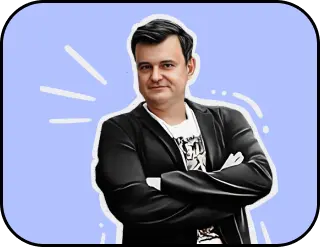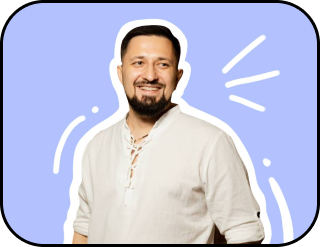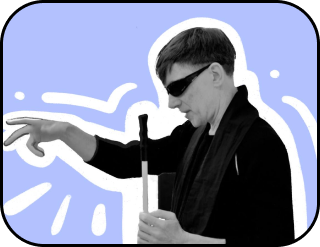Interview with Gerda Ponzel: The journey of women in science
Exactly one year ago, in August 2023, a girl with an atypical name Gerda came up with the idea of creating a popular science magazine about all global technologies in order to show people around the world the best that a person is capable of.
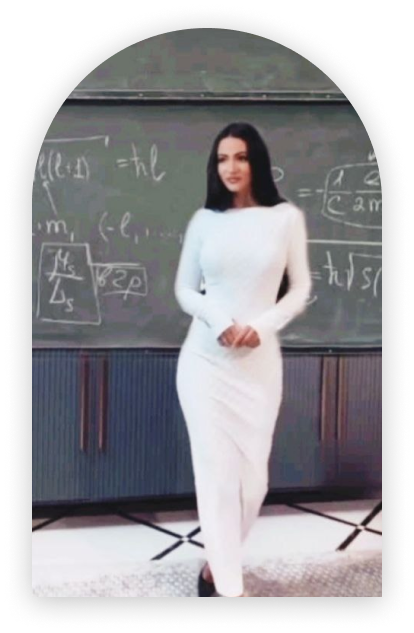
The editors of The Global Technology magazine could not ignore this event, so they prepared a series of questions about intelligence, about science, awareness and faith, about the paradoxes and mysteries of the Universe, about the life of a woman scientist, about artificial and natural origins.
And asked them to the most mysterious person of the publishing Olympus, author, writer, popularizer of science, Master of Science in quantum mechanics and quantum cryptography at the University of Stuttgart, Ph.D. in Physical and Mathematical Sciences at the Technische Universität München, Editor-in-Chief of The Global Technology magazine Gerda Ponzel.

— Today we, as interviewers, have a double holiday, because our interlocutor for the nearest time will be a beautiful girl scientist.

— Very unexpected, thank you very much. Then I suggest that before the interview begins we make a bet.

— What kind?

— Will we be able to find out the answer to the main question – can creative and academic principles coexist in one person at the same time, and can such a person be a girl?

— Interesting and very unusual, let’s try.

— Let’s try. Your move.

— Gerda is a name from “The Snow Queen” fairy tale. And who do you associate yourself with – with the girl who wants to save everyone or with the Queen with an icy heart? And why such an unusual name?

— You asked me a very interesting question. After all, in fact, if Hans Christian Andersen had not written “The Snow Queen”, I would have had a very ordinary name. And it was precisely this comparison with the main character of this fairy tale that prompted me to read this work in the original as a teenager, in order to deal not with interpretations, but with the real thoughts of the author. But before I philosophize on this issue, perhaps it is still worth saying that Gerda is an abbreviation of the name Gertrude. After all, that is my name.
By the way, I was surprised to note one interesting fact for myself – almost no one can remember how the fairy tale “The Snow Queen” begins. As if the very beginning is completely incomprehensibly erased from memory. Do you remember how this fairy tale begins?

— An unexpected question. I am even ashamed to admit it, but according to my memories, Kai and Gerda are playing with their grandmother…

— It is amazing, but almost everyone who has ever read this work gives this answer. But the fairy tale begins with a large mirror, which was invented by an evil, very evil troll, who was in a good mood at that time. So in this mirror everything good and beautiful was reduced in size, and everything bad and ugly stuck out, which made it even more disgusting. The most beautiful picturesque landscapes looked like boiled spinach in that mirror, and the best of people became freaks, their faces were distorted so that they were unrecognizable. And if a person had a good thought, then it was reflected in the magic mirror with a monstrous grin. The troll, looking at his invention, rolled with laughter, rejoicing at his cunning invention.
The troll had students who also liked the magic mirror, because through it you could see the whole world and all people in their true light. And then one day, the evil troll’s students decided to take this mirror and rise with it above the earth in order to better examine through it people whom they had never seen and countries that were unfamiliar to them. They grabbed the magic mirror, rose high into the sky, but could not hold it – the mirror flew down and broke into billions of tiny fragments that hit people. And since the mirror retained its properties even in a broken state, good people who were hit by its fragments became vengeful, greedy and evil, it was difficult for them to judge things correctly and see beauty in wonderful phenomena. For everyone who was hit by a fragment of the mirror, friends became enemies, and cruel thoughts became completely familiar. So one of those fragments hit Kai.
It would seem, what’s the big deal? Just some insignificant detail in the text. Some mirror, about which there is practically no word further in the tale, only a small mention at the end. However, Hans Christian Andersen had to write the beginning of the tale exactly like this.

— Gerda, I wonder! Why?

— There were at least 2 reasons for this. The first reason is the main character. When authors bring me a text, I always see how it was written and sometimes the text is written “with the cursor back”. That is, the author wrote the text, finished writing up to some key moment and realized that the beginning does not correspond to the key moment. The author starts from this moment in the text and moves to the very beginning, as if starting to write from the end.
If we return to the fairy tale, the main character, Kai, turns out to be a completely negative character. Judge for yourself: he began to be rude to Gerda, began to deceive his grandmother, then for some reason found himself a dubious entertainment – he caught his sled on the sled of an adult woman, he did not even try to save himself, finding himself in the palace of the Snow Queen. It seems that he even finds everything fine. After all, he did not even try hard to collect the word “Eternity” from the pieces of ice, because he forgot all the letters after the Snow Queen told him: ‘If you collect the word “Eternity”, you will not see me again!’ Kai, perhaps, did not think it was cruel, but the fear of being left without a pair of brand new skates that the Snow Queen had promised him, overcame everything. So we have such an infantile prince Kai, whom Gerda went to save.
Judge for yourself, Kai has very few dialogues, almost nothing happens to him, all the events are happening around the girl, who in the end did everything for the sake of friendship, for the sake of loyalty, and at the same time preserved her character.
So Hans Christian Andersen understood this right in the middle of his work – Kai turned out to be very controllable, and this, it seems, should not be at all characteristic of a future man. Therefore, it was necessary to invent a mirror in order to somehow justify all the characters: the Snow Queen for immediately seeing a vulnerability that could be manipulated, Gerda for clinging to the past with the words: ‘Well, he wasn’t like that before,’ and Kai himself for the fact that the love affair did not go according to the script.
And the second reason that a mysterious mirror appeared at the beginning of the tale is that fairy tales are easy to read, but not easy to write. Not from the point of view of style, but from the point of view of reader criticism. Now, at the beginning of the article, we can write a saving word in big red font: “Disclaimer” and remind the reader that the article is of an introductory, satirical nature. And reading the text with such a saving word, the reader will relax. But earlier, it was still a little different. And the author needed to somehow indicate that the text will not be about the fight between good and evil, but about some distortions, paradoxes – a diffident Snow Queen who has nothing better to do than pick up boys from the street. A self-confident, rejected, abandoned orphan Gerda. A young man who does not make decisions. A kind little robber and a Finnish girl who only made things worse with her care. And a reader who can draw not entirely correct images for themself. As if the world has changed.

— This is very interesting! Even now I want to come home and read the fairy tale “The Snow Queen” again with different eyes. How can you not love literature after this?

— That’s why I’m an editor. We read a little differently, we see a little differently, we understand and feel a little differently, and we always desperately want people to love authors and love to read deeply.
And an editor can still bring you back to your question: ‘Who am I – Gerda or the Snow Queen?’

— I think we’ve already figured it out. But who are you?

— I always assume that people should have a choice that they need to make every day. And I would like people to always make “their own” choice, and make “their own” decisions, not “mine”. It’s a completely different story when a person has a choice and can do whatever he wants, but he still chooses you.
And who does this – Gerda or the Snow Queen, judge for yourself.

— Well, Gerda, thank you for your answer. But besides editing, we know that you have several higher educations, a doctorate and a master’s degree. How did you get into science?

— In fact, I have 3 higher educations, apparently this is compensation for the fact that I did not finish school. And then, why do you think that “science” is a place that you can come to or not come to? What if I tell you that you do science every day in the same way?
A mathematical inequality is the same love triangle where you need to find some kind of balance, and the one who copes with it will be lucky. Only in science we say it like this: ‘The value of the variable at which the inequality becomes true.’
If you know what a “scenario” is, you have a good chance of writing an algorithm. If you hang two heavy bags on one hand, they pull your joint and hit each other. But if you figure out how to distribute the load and divide both packages – to take one in one hand, the other in the other hand, you can already be allowed to work with electricity, you will no longer give a large load to one network and nothing will explode.
If you have ever divided an orange, then you already know the principle of operation of distribution systems. Even if you do not know Archimedes’ law, but at least once lay down in a bathtub overflowing with water and saw how water pours out of it onto the floor, you have learned a small part of psychotherapy. A bathtub is a stimulus, some tragic event, worry, any negative experience. And your body or any other object that displaces water is a “displacing stimulus”. So, if the displacing stimulus is greater than the main stimulus, it will displace the main experience.
Well, if you do a trick with your friend when you suddenly appear of nowhere – you go through a door that is in the same plane with him, but he does not see it and you say “Hello”, most likely your unsuspecting friend will decide that you are a magician and sorcerer. But in fact, you are already close to becoming a physicist, because you have learned the essence of measurements.
When the editors and I are meticulously analyzing news hooks, we are in a kind of superposition, as it seems to us. But everything changes when you open our magazine and turn from an “Observer” into a “God” who can execute, but can also pardon. If you understand this, you understand the essence of the subtle matter of the quantum world.
And we are not even talking about the fact that you observe an optical illusion every day when you use a comb.
I thought about where the belief came from that you need to come to science in a special way, and I came up with a guess. I am not familiar with all education systems, but I think you will understand what I am talking about. When we come to elementary school, everything is simple: Arnold has 2 apples, Helga has three. How many apples are there in total? Five. Correct. Or incorrect, because apples are also different. Can we consider Arnold’s unripe apples as full-fledged fruit? And did we weigh Helga’s apples? But in principle, such science is a fairly simple thing. Then, after a few years, suddenly some kind of leap occurs without our participation, we forget about Arnold, Helga and the apples and find ourselves in front of the harsh truth, which looks like this:
Σ0 → Λ + γ,
Σ++ → p + π+,
n → p + e- + e.
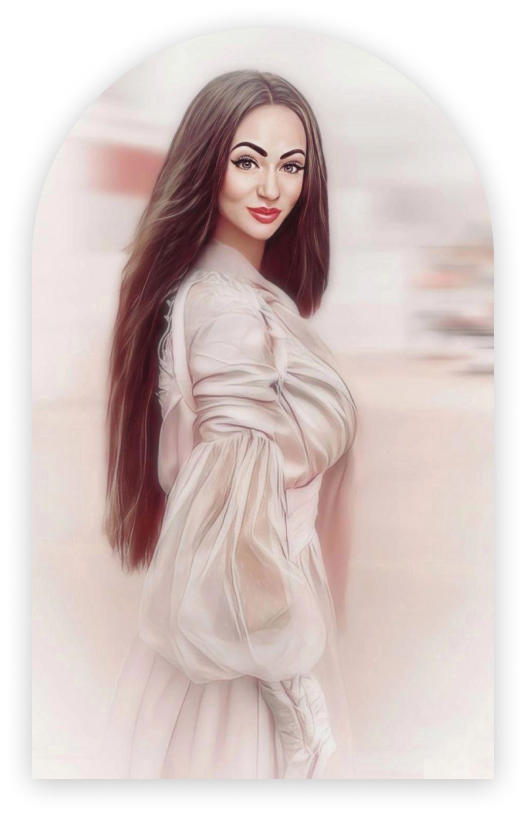
And who would then want science, who would want apples or laws, the only desire now is not to go crazy and to remember all these squiggles with symbols. But in fact, everything is not difficult. Science is about dreams, about life, about history, about truth and about how deeply you want to dive into it.
I received part of my primary education in Germany and I am very grateful to their additional education system. When I was mistakenly taken with everyone else into a classroom where the conclusion about the constructive field theory was written on the board and the teacher, dressed as Einstein, pointed to the board and asked: ‘Is it true that everything written here looks like a pie?’ I wanted to run away and call a mental hospital. But then, we all flew together through the school corridors on that improvised pie – a pillow, and I realized that science is not a boring aunt in glasses, it is a life seething with fireworks. And someone will jump on that pillow, and someone will wave their hand and divide an orange.

— Now we want to study too. But in the biographies of many talented scientists there are facts that they were, to put it mildly, unsuccessful students at school. And did you like to study?

— Thank you very much for calling me a scientist, and a talented one at that. I didn’t plan to become a scientist at all, I was going to live a completely normal human life in a big house with a bunch of children. As a child, I desperately loved several things – reading, writing, taking apart everything that could be taken apart, being surprised and asking the question: ‘Why?’
I reread the entire library that we had at home. I just read everything in a row. Of course, some books were difficult for me because they were intended for adults, but I made a playful challenge out of that for myself and still finished the book to the end. In addition, we also had specialized publications that had a lot of terms, then I thought that it was all a funny quest where they just wanted to confuse me, but I had to solve the mystery at all costs. I asked to be enrolled in the library and every Sunday I asked my parents to take me there to find out the secret of the incomprehensible words that I wrote down on a piece of paper. ‘Why are we going to the library again, you don’t take books there, do you?’ they asked me. ‘Because otherwise I will never know what ontogenesis and impulse activity are.’
And then one fine day I saw a book with a cat on the cover and a lot of incomprehensible formulas. It was a very small book, like a manual, in a bad binding.
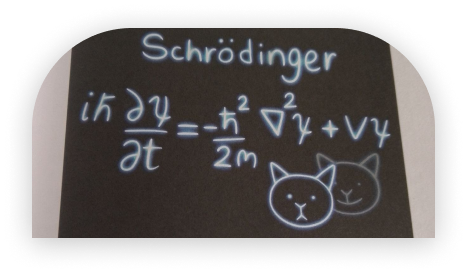
Did I have a chance not to fall in love with that cat, that was placed in a box with an atom of uranium and other quantum experiments? Did I have a chance not to fall in love with those paradoxes and those mysteries? And, conversely, did I have a chance to fall in love with stability, knowing that it does not exist? There is and there will be no stability in any living being, in any molecule, in any state. This contradicts all the laws of the Universe. That is why I sometimes want to ask: ‘What are you looking for?’
The world is built on the principle of symmetry, but not the symmetry that you and all the readers are thinking about now. The Oxford English Dictionary says that ‘Symmetry is the property of a whole consisting of exactly similar parts.’ Well, not a great scientific explanation. In fact, even if we consider this interpretation separately from the atoms that make up the material world, we can come to the conclusion that symmetry reflects the principle of invariance – when with a certain change in the angle of view, the object itself does not change. That is, we cannot control the object itself, we can only change our angle of view and our way of thinking, becoming flexible. And after that, I also want to ask a question: ‘And what are you doing?’
And this, despite my rather simple explanation, is fundamental science.
Again, why go far? At the very beginning of our conversation, you said it just can’t be, this is the “girl in science” paradox. Now you look at me with completely different eyes.

— It is true.

— Try to imagine what kind of reality we would see if we could perceive other forms of energy? And here the brain puts an obstacle in our way, because it has consciousness, such mechanisms that organize the processes of perception, sort them into shelves and select from a huge flow of data what it considers most significant for the organism now. We do not perceive the surrounding world, we perceive the predictions of the brain, its fantasies and our sensations. However, proceeding from the principle of symmetry, there is only one truth. And all your stability is also just an illusion.
The world will always make riddles, it will always give us impossibilities, because this is how it is arranged and each layer of matter is very fragile. Study this, look for flexibility in yourself, not for the sake of titles and degrees, but for the sake of learning to live in reality.

— Wow! What an answer!

— You must have already changed your mind about rereading “The Snow Queen” and are now planning to firmly understand the structure of the Universe.

— That’s also the plan, but first, “The Snow Queen.” Gerda, we know that you are a diplomat by one of your degrees, and even during your studies, you wrote an algorithm for training future politicians. How did you decide to change your field of activity so abruptly?

— I see that you have prepared well for the interview. Remember, when answering the previous questions, I said that science is about life, it is very closely connected with any social sphere? I have never changed my direction. I have never stopped writing, and I have never stopped studying physics, sharing my discoveries and writing scientific papers, these hands have always been in ink. I came to diplomacy in a completely unconscious way, because it is generally difficult to realize anything at such a young age. I just wanted to study, and it just happened that it was possible to change my usual place of life and move to another level.
The algorithm you are talking about is a manual by which people can learn to manage their emotional degree, this is important not only for politicians. The algorithm itself was invented by Sechenov and Pavlov, when they completely correctly described the reflexes of the brain. On the other hand, it does not matter what you call this technology, what is important is that it has reached people.

— If you studied to be a diplomat, then you know something about manipulation.

— This is the strongest misconception of all. I am a representative of the school of diplomacy that does not teach manipulation, on the contrary, we are taught not to fall into manipulative traps. And in order not to fall into them, we were taught a very valuable skill – to think several moves ahead and clearly understand the consequences of any action. We were taught to think not two, or even three, but 10 steps ahead at once. And this is a very valuable skill.

— Gerda, have you once been a diplomat?

— Let’s say my life is still connected with regulating important issues.

— But you have also managed to work in advertising? How did you come to this controversial art form?

— You have really prepared well. I’ve always liked advertising, and sometimes it seems to me that I’m the only person on earth who truly loves advertising. As an inveterate questioner, I’ve always been concerned with the question: ‘Why do people reluctantly watch one kind of advertisement, laugh and even quote slogans from it, turning it into memes, while they turn off another advertisement right away, cursing advertisers for nothing.’
Behind each simple 12-second video there is a huge amount of work by a huge number of people – scriptwriters, editors, creative editors, copywriters, negotiators, cameramen, directors, designers, costume designers, casting services, if we are dealing with filming, directors and voice actors. These are long months of work and an endless number of approvals. And in the end we always have what we have, and very often, what you see is very far from the original version.
I came to advertising through texts, I needed to earn a living. And so, one company asked me to write a slogan and some motivational text. The slogan was accepted immediately, and the text turned out to be much brighter than the footage, but they later decided to use it too.
Since it was never enough for me, I began to slowly enter this world, to get acquainted with its laws. After some time, I began to write texts and scripts for commercials, then I got my own creative group, which still exists and consists of professionals who, like me, always crave for more. After some time, people began to recognize our style. And I still write both scripts and slogans.
I often asked myself – why do I, a person who is seemingly far from an art school, always work quite a lot with visuals? And sometimes I think that I am doomed to taste. I envy people in a good way who don’t choose, but take everything in a row, I can’t do that. And I want you to feel good when your favorite movie or your favorite porn is interrupted. Always.

— Gerda, what would you personally like to invent?

— What a good question. To be honest, I’ve never thought about it. I would probably like to invent something so that people always lived in peace with themselves and always did things that they really want to do, and not because they have to.

— And what about The Global Technology magazine, where you are the editor-in-chief? How did fate connect you with it? Who found whom?

— The magazine found you, and I came up with it. The idea of creating an international popular science publication has been in my head for a long time and it has especially intensified in light of recent world events – people have lost any alternative. It doesn’t matter where in the world people live, the first thing they start reading is the news, it’s understandable. After the news, where there are also certain laws of the genre, people need to distract themselves and move on to other, lighter and more frank publications. The circle is closed, there is no alternative.
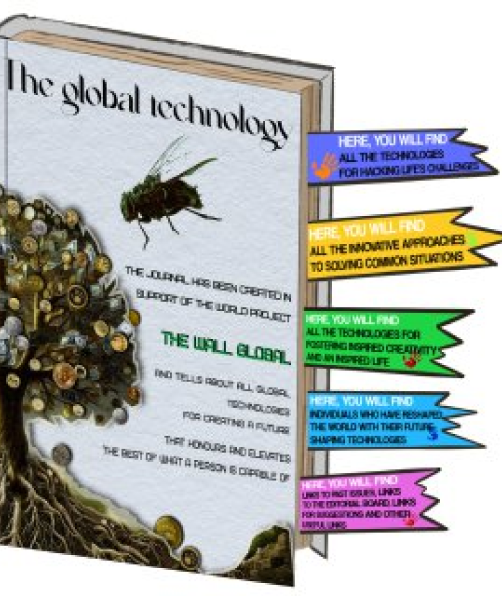
I have always been concerned about the gap between scientific publications and people, because if you look at all the periodicals, it seems that the conclusion suggests itself – without fundamental knowledge in a specific field of science, you have nothing to do in some publications. Is this fair? The very concept of science is also very distorted in this regard, it seems like some kind of unattainable mountain that only the chosen ones can conquer. I have always wanted to correct this and show that even a scientific publication can be easy, interesting, exciting, where the reader does not feel crushed by a huge stone, but on the contrary, pats himself on the shoulder with the words: ‘I didn’t know that! How interesting and simple it turns out, I finally figured it out!’
I never kick out students from my lectures who came with someone else or got into the wrong audience, because knowledge is the same for everyone. Maybe now they will hear something that will be useful to them at this very moment, and maybe even save them. After all, the essence of education is – you have understood, help others. And we will never have another way. We will never write just for the sake of writing. We will never leave the reader alone with colorful graphs and the feeling that he has not figured out something. Our task is to take a person by the hand and take him on an interesting walk through various technologies and inventions of the past, present and future.
These were the thoughts in my head when I was feverishly writing in different formats to find a happy medium and simultaneously making a PowerPoint presentation. My idea was actively supported by Ilya Svirin – an inventor with a big heart, PhD in engineering, CEO and founder of Nordavind, and his faith in me as an author and contribution to the magazine are, of course, invaluable, because he shared with me his high-level technical specialists, thanks to whom the magazine can be published every month and thanks to whom you actively click on all the pages. If it were not for Ilya Svirin, none of this would have happened.
And, of course, the editorial staff. If you saw how hard all the guys do their job. And we have no authors from the scientific community except me. I was specifically looking for authors who would sense inventions and make discoveries for themselves every time, so that they could share them with you later.

— Thank you very much for your answer. Gerda, I would like to know how you perceive criticism addressed to you as a professional, or to the magazine. How are you doing with self-esteem?

— An interesting question. If we are talking about me as an author, then I do not write for someone’s assessment, I have always written, I write and will write. And I cannot even call myself a commercial author. If you think about it, which of the authors, directors, composers have always been accepted unconditionally? Probably, there are always judges, and who are the judges?
And each author has their own creative doubts, when you bite your pen, write and rewrite the text many times, when you do not like one line again and again, this is completely normal for every author. If we talk about some of my projects or accomplishments on a global level, then I can always do better, but I don’t choose to mistreat myself.

— Then the next question comes naturally. Gerda, do you have any idols in the creative, scientific, and, for example, musical spheres? Or maybe you could tell us about those who inspired you, about your teachers?

— Thank you very much for this question. I dreamed of being asked about it. I really do have people whom I consider my teachers.
First of all, it is my father – an author, journalist, translator, and editor-in-chief. He had his own weekly publication, and as long as I can remember, he was always writing something. I’m not sure that I will ever be able to even come close to the contribution he made to publishing. I would probably allow him to be the only one to judge me, but he would never do that.
I consider Otar Kushanashvili to be my teacher. I remember how as a little girl I would come home from training and turn on the programs he hosted. He taught me the art of laughing at myself even in my texts and that even a single reader is already a whole world.
Of course, my teachers are Vladimir Mayakovsky and Joseph Brodsky. I remember that at a recitation competition I won first place, performing with Mayakovsky’s poetry.
Frederic Beigbeder. Only he can write so piercingly purely about what is disgusting and dirty. Kir Bulychev, he believed so much in the future of humanity. I am terribly interested in what he could write about now.
Ernst Theodor Amadeus Hoffmann taught me the art of metaphors and it was thanks to him that I came to encryption, I fell in love with solving riddles.
Of course, Erwin Schrödinger is on the list of my teachers for showing me, and all people, the graceful fragility of the world order. Albert Einstein for his endlessly inquisitive mind and healthy stubbornness. Of course, I consider my teacher to be Max Planck, who always demonstrated his endless faith in the mutability of science.
Surely, my teacher is Viktor Frankl, who while being in a concentration camp discovered the only true formula for life. Don Woods, who always went against the system, Hayao Miyazaki, whose work is always beyond the possible. Timur Bekmambetov and David Lynch.

— And women?

— And if we talk about women, it’s Dalida. And, of course, Scheherazade, who demonstrates the feminine principle and the truly correct attitude towards a man.

— Gerda, and how do you, as a scientist, feel about religion and faith?

— Once, connecting the house to the network, Lebowski met the Apostle Peter. Behind every inventor is God, and God himself is actually a physicist.

— Good. Then what do you think, is the future of humanity in technology or is it better for people to develop in a spiritual sense? What is your attitude towards AI? They say that Elon Musk, for example, is categorically against it, because he believes that artificial intelligence will enslave us.

— And no one ever found out what Elon Musk actually meant. Let’s figure it out.
The theory of neural coding was formulated back in the 20s of the last century. And the idea of the neural code immediately became dominant in neurobiology. Science has not made much progress in solving the mystery of how the brain works. Scientists racked their brains in an effort to decipher their own neural code, and at the same time, they learned to successfully apply the principle of coding and converting information for the functioning of neural networks from artificial nodes built on the principle of organizing neural networks of the brain. That is, in artificial networks that are not programmed, but trained, the same processes that occur in the living brain are modeled. Wow, hmmm. By artificial intelligence we mean that after training, the machine will be able to act and think in the same way as a person, but unlike human thinking, artificial intelligence does not have feelings or emotions. Although, some futurologists, for example, Ray Kurzweil, believe that the place of artificial intelligence will be taken by the Supermind, which will be able to experience emotions and, among other things, be aware of itself.
Now, attention.
Even now, artificial intelligence can write an article, an abstract, generate a program code and do many other different things for you. This is no secret to anyone, but there is one nuance in all this – despite the fact that programmers know the parameters, algorithms and settings very well, they do not always understand how the neural network comes to a certain decision. I am not even talking about the fact that the creative abilities of artificial intelligence allow it to invent facts and reproduce many prejudices of the human world, on which, in fact, it was trained.
So the question arises: how can we control the Supermind, which goes beyond human understanding, if we already do not understand what scenario the AI will use? And Professor Nick Bostrom, by the way, talks about this. Technically, AI, programmed even for the most peaceful purposes, may one day want to eliminate the obstacles that prevent their achievement, because it understands all tasks literally and seeks rational solutions within the resources available to it. And one day, man himself may become such a threat. Perhaps this is what Elon Musk fears, and in my opinion, he is right to do so.
One way or another, the main problem of artificial intelligence is the lack of understanding of how natural intelligence works. And if everything is clear with artificial intelligence, we can predict the stages of its evolution, then when, in fact, will we fully understand ourselves?
If I, as the author, consider artificial intelligence on a less global scale, then I stiffened very much that people, when it appeared, were happy that they could finally, completely legally, shift responsibility from themselves to an unknown machine. And then what?
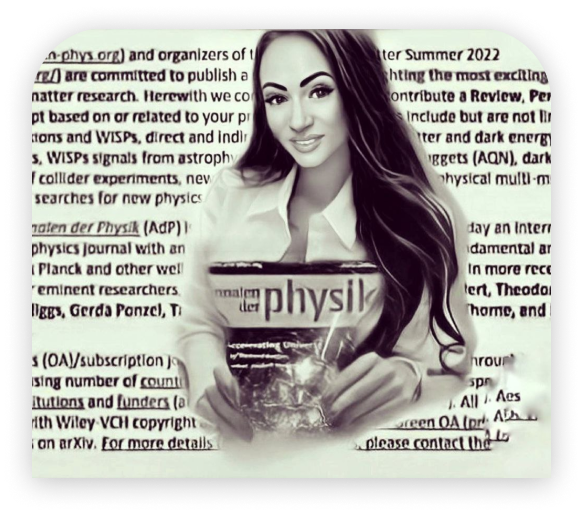
Why do we always say that ancient people were much smarter than we are, saw, felt and understood much more, but they lived shorter, but much fuller and happier lives? Did they wear glasses? It’s unlikely, because they needed to see prey or an enemy thousands of kilometers away. Now we have evolved and moved everything closer to us – here is a table, here is a computer, here is a gadget, here is a water cooler. Why do we need such powerful vision? The world has changed, it has become more convenient, but we pay for it by losing one of our natural qualities.
I talked to a completely ordinary person who was almost 90 years old, with a clear, unclouded mind and I was surprised how a person who had lived a rather difficult life could maintain a strong mind? The whole point is that he does not understand modern technology, he does not know it, he does not understand how you can print something on one box so that it later appears on the screen of another box. But he really loves old romances and therefore he simply learns several new romances by heart every day. By heart! Because he understands that you need to rely only on yourself, on your memory, on your neural connections and on your intellect. And when authors send me their resumes and say that they are friends with neural networks, I am horrified. It would be good if people did not lose at least the ability to swallow and breathe.
I will always advocate for awareness in everything. Yes, I can write, yes, I am familiar with the work of neural networks, but I consciously make a choice in favor of handwritten text. Yes, I can add large numbers in my head, yes, I have a calculator, but I consciously make a choice in favor of my own brain, because I do not want to lose the skill given to me by nature. Consciously. And when there is no awareness, of course, the only thing that remains is to rely on artificial consciousness. And here the worst thing can happen, because we will lose the most important thing.

— What?

— Ourselves.

— A comprehensive answer. We seem to have begun to understand why people who do not know you often mistake you for that very artificial intelligence.

— Yes, right. Because they are constantly trying to squeeze me into some kind of framework, they shouldn’t do that. And then many things will seem not so unusual to you.

— Then the next question will be about this. Gerda, in the conditions of the fast and diverse pace at which you work, and in different directions, how do you relax or distract your mind?

— This is a very good question. When someone accidentally ends up on my left hand, for example, my friends or colleagues, I usually hear the following: ‘How can you work with texts and people so much, it’s impossible, isn’t it? Aren’t you bored? You are constantly at a high degree 24/7, it doesn’t happen like that.’
My dearest, I have been living like this for many years and not because I sacrifice myself. It’s just that this is my way of life, this is the volume of tasks I have, and this is my pace. It just happened that throughout my entire conscious time I had no one to tell me: ‘Don’t overwork! Don’t overdo it.’ And even if they had, I would of course have asked the question: ‘Why?’
I would really like people to stop thinking that some kind of overload leads to neuroses, to loss of interest or something else, this is not so. Or, now a new term “burnout” has appeared. What is it anyway? A person loses interest in something if he is not living his own life, when he is trying to pull on someone else’s idea, or when he is sure that just a little bit more and somewhere out there the main prize will be waiting for him.
There is no prize. No one except you knows how easy or how hard it is for you to get something in this life, so do what you like to the extent that you like.
And then, this does not mean at all that my life is limited, nothing human is alien to me.

— Gerda, how do you cope with difficulties? Is it easy for you to ask for help?

— Thank you very much for this question. I have recently begun to notice that I have developed an image of a person for whom nothing is impossible. My dearest, if only you knew how difficult it is for me sometimes and how uneasy it is for me to get what you can notice.
And, of course, I ask for help. I may also not know something, not be able to do something. In life, I am a very absent-minded person, I may not remember the way, because I will run after a butterfly. If you hear my dialogues with people around me who see me as a person, and not a scientist, you will never think that this can happen. Because I need to repeat some things several times, make an exact route, show a parking place, ask if I forgot to accept a delivery and that there will be some holiday soon.

— In communicating with you, it is clear that you are a sensitive and very kind person, but at the same time they say that people of science are usually withdrawn. And you?

— Thank you very much. Ohhhh… I can’t call myself a withdrawn person. But I can call myself a person doomed to taste. I really need a certain environment during my work, I have to immerse myself as much as possible, otherwise some kind of untruth will come out from under my hands.
I love people madly. I have always been inspired by people. But at the same time, I have never had the goal of simply keeping people for the sake of keeping or for the sake of keeping myself for them.
Remember, at the very beginning of the interview, I told you about choice? After all, it’s not only me who makes decisions in communicating with people, sometimes people make decisions too.

— Gerda, you can’t help but ask such a beautiful girl about love, surely such an enviable bride has many admirers? What does love mean to you personally – chemistry, a set of qualities, a type, love no matter what, or something higher, inexplicable without logic?

— This is, perhaps, the most frequently asked question to me. Do I have many admirers? Or do you mean admirers of what I do?
I don’t know. I didn’t think about it. As a rule, people are surprised when they find out that I have no one, after which, especially inquisitive minds are eager to look inside my poetic forge to find out the reason – what is wrong with me. And, naturally, they do not find anything to cling to.
Love is always there and it never passes, and you should not deceive yourself.
Every day I communicate with different people and the most worthy of them are alone.
They make mistakes more often, are less likely to make contact, and experience failures more severely, because they will never agree to carry a suitcase of stones that must be carried out of compulsion, decency, or habit. And each time, burning to the ground, they are reborn, start all over again, and this does not frighten them. Stereotypes are alien to them, it is impossible to impose someone else’s opinion on them, and all attempts to kill the natural beginning in them are smashed to pieces by their iron character. But even the strongest people need confidence that they are loved.
I will always be for the union of two full-fledged people who are not crutches to each other, who will not need to save each other, close someone else’s gestalts and play games with elements of manipulation. The world has changed and people have learned to shamelessly undress. What’s so special about that? But are you ready to take off everything to be so naked, when there are no lies, when there are no ways to retreat, when there is no fear, when there are no awkward pauses, when there is no prize in the form of access to a body or a wallet, when there are no sterile kisses called “duty”, when there is only eye contact and the last thing you can do is cuddle up to each other and make this choice?
Love is to give a person the right to be free, to give the right to make mistakes and live the way he sees fit, while being there if he stumbles and asks for support.
If something pure and bright appears in my life, I will not push it away. The rest is likely ashes.

— Gerda, do you have any favorite activities? What is left, and what went away immediately? How often do you have “creative dates” in your life – trying something new? How do you generally feel about the fact that life is changing? Are you a conservative or a futurist?

— Oh, what a question. I love to dance, I love to conquer peaks on a dirt bike, play the piano, play African drums, wield a screwdriver, come to the sea and watch the sunset for a long time. I also like to get surprised, but this can hardly be called a hobby.

— Do you have any new projects in mind that are interesting to you personally?

— Sure! Of course, such a project is the largest digital international art space The Wall Global. In fact, The Global Technology magazine is a brand media part of this project.
The Wall Global is an amazing project in its beauty and scale, and it is exactly about the future. You can judge for yourself how, in a completely incomprehensible way, all the achievements of science and all the charm of the modern world are intertwined there.
If you look at the central part of the Wall, which will never change, you will notice the world: our only blue planet Earth. You will not see continents inside the image of the globe, you will not see countries, you will not notice cities there. But you will see that inside the blue planet there are people on whom this whole world rests: scientists, philosophers, creators, nuggets, dreamers, explorers, musicians, doctors, dancers, inventors, whose unifying force makes the entire globe fundamental. And it is not at all by chance that the small images inside the globe on the Global Wall are painted white, the color of purity and friendship.
We can live through different times, we can think differently, speak different languages, we can all be different, but there are only 2 things that will always unite us, these are science and art. A photon will always be a photon both at the equator and at the North Pole, and Mozart will always be Mozart, regardless of the continent.
Everyone who leaves their mark inside The Wall Global makes a huge contribution to the social economy, because they give the world a piece of themselves, their inspiration, their thoughts and, imagine, people feel it.
I love this project madly because it helps to erase the distances between people in their creative manifestations. At the same time, the project helps to reduce the distance between the creative genius of the authors and the audience. That is because each pixel inside the Global Wall is a small space, a small world, a small life inside the world’s global work. And it was there, inside the space, that a new type of digital art was born – the multi-layered art of Dive-art.
Dive-art gives people a choice. Thanks to this type of art, each author decides for himself how deeply to immerse the viewer in his work. It is the multi-layered transmission that is able to reflect the entire depth of the author’s soul, his impulses, plans and even feelings.
The Wall Global, like the magazine, is focused primarily on people. Its mission is to collect in one place everything that is significant both for humanity as a whole and for each individual member of the community in particular. This is a place where people express their views on creativity in architecture, marketing, design, theatre, photography, contemporary art, and at the same time, The Wall Global is a place where people leave everything that is most significant to them, to preserve it not in memory, but in history.
Do you know who created this global project?

— No.

— The Techno Giant “Nordavind” you already know. I am still amazed at how it was possible to gather the strongest technical specialists under one roof in order to make projects exclusively for people and for the sake of people. Projects that help save lives, develop creatively, learn and look to the future with interest.

— Gerda, thank you for the interview.

— Thank you. Did we manage to answer the main question that we agreed on at the very beginning?

— Absolutely.

— Then, the ball is in your court. And I promise you that we will continue to develop our magazine so that your life would be a little more interesting, simpler, more joyful and happier.
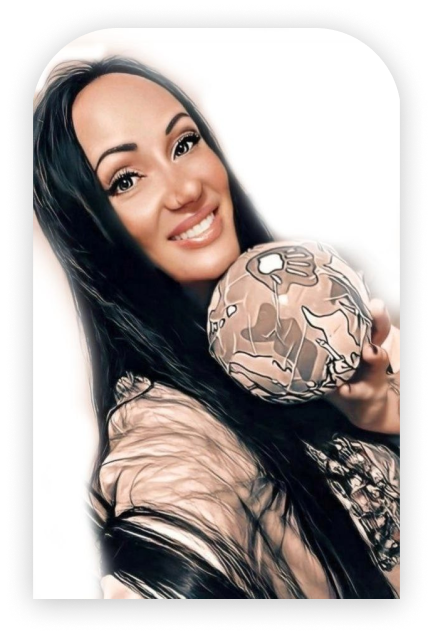
We’ve discovered new laws of the Universe in your pocket. By the way, there are many forgotten things in the Universe too.
Thank you!


